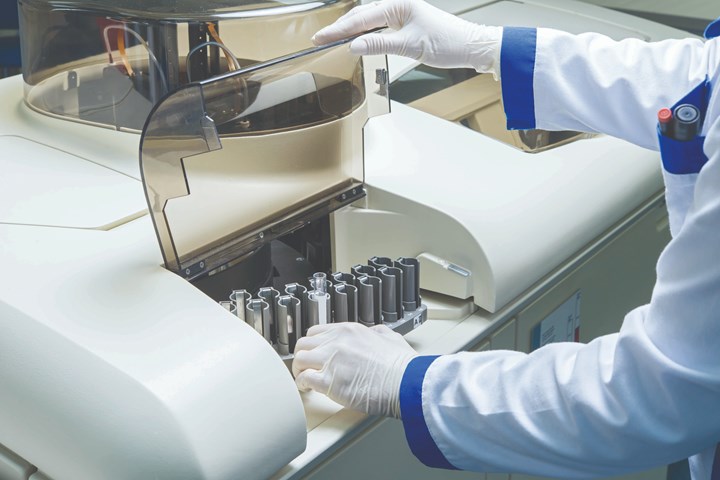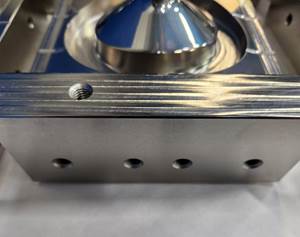
As medical diagnostic technology accelerates, there is an increasing need for plating solutions that can yield high purity surfaces.
Photo Credit: Uyemura
It’s an understatement to say that virus detection and tracing has become more advanced and more important than at any time in history. The COVID pandemic shined a spotlight on the importance of rapid detection methods for slowing the spread of the virus. The combined forces of the medical community and the manufacturing industry rose to the occasion out of necessity and in doing so found new ways to innovate. Strides continue to be made involving the advancement of medical diagnostics.
Unsurprisingly, many finishers saw increases in medical sector programs during the pandemic. It should also come as no surprise that many are looking to the medical device industry as a new opportunity for innovation and business growth. Uyemura (Ontario, Calif.), a leader in specialty surface technologies with a long history serving the general metal finishing industry, has an eye on manufacturing trends and is excited about new opportunities in the medical sector.
Historically, the company’s experience in this arena has been providing finishing processes for printed circuit boards and other electronic components used in medical device manufacturing. Uyemura also has a number of hypoallergenic and antimicrobial coatings that have benefited the market. In addition, the company supplies metal coatings, such as platinum, for instruments that are used for blood analysis.
As trends in the medical world emerge, Uyemura has a growing involvement in the ways their expertise can enable new applications. One of the areas where Uyemura technology has been successful is medical diagnostics. The company is specifically involved with the use of spectrometry to detect the presence of pathogens.
In simple terms, spectrometry is a field of study that measures and interprets frequencies resulting from an interaction between electromagnetic radiation and matter. It is used as a tool in physics, chemistry and astronomy to determine the composition and molecular structure of matter. One important application lies in the field of medical imaging — tissue analysis, for example.
Richard DePoto, business development manager for Uyemura, is interested in the way the technology is being used to identify viruses and other pathogens. DePoto points to virus “readers” that allow a saliva sample to be analyzed in a device that uses spectrometry to prove or disprove the presence of the suspected pathogen.
“A saliva sample is applied to a high purity surface and placed in a reader that bombards the sample with radiation or ions, making the pathogen visible and identifiable,” says DePoto. “Eventually, compact reader units could be available for widespread home use. In fact, I think that will happen fairly soon.”
A need for high purity surfaces
According to DePoto, this spectrometry-based diagnostic technology is contributing to increasing demand for noble metal surfaces such as gold, platinum and palladium and the quality requirements for such surfaces in the medical sector are becoming more stringent.
“Medical diagnostics technology is advancing rapidly, thanks to growing need, and aggressive funding,” says DePoto. “One area of the market that has evolved over time is what I’d call ‘high purity surfaces.’”
DePoto says that over the past 2-3 years medical device manufacturers have pursued input and partnerships for developing these types of surface conditions. “These are surfaces where none of the under-metals — copper, nickel or anything similar — are detectable at all,” DePoto says. “They want a coating thick enough, with a low enough porosity and tight grain structure to provide a highly pristine surface.”
DePoto explains that many metals commonly used for metal finishing can interfere with spectrometry-based pathogen detection. Nickel, for example, can exhibit some of the same peaks and overlaps with some of the pathogen identifiers. Therefore, making sure nickel is undetectable with these surfaces is a requirement.
DePoto points out that such technology has evolved with the advent of wearable devices. Uyemura has years of experience working with wearable surfaces. “We particularly concentrate on surfaces that have very high resistance to corrosion and sweat,” he says. “The salt in the human body creates a galvanic battery corrosion issue. We have developed robust surfaces for withstanding sweat tests.”
Uyemura is actively collaborating with medical diagnostic companies that are developing this technology and finding new ways to provide the high purity surfaces that are required. The company built its business supplying precious metals for a broad range of specialized applications; DePoto describes Uyemura as a recognized supplier of specialty chemicals, rather than a commodity chemical supplier.
“All of our products are more than niche — specialty alloys that are designed for more specific applications,” DePoto says. “Plus, based on our company organization and our structure, we have the agility to develop innovative solutions. That’s why we’re a good fit for where medical is heading.”
Quick results
Unfortunately, COVID has become part of our everyday lives. Reliable, quick testing is an urgent need that remains unmet. Anyone who has taken an at-home COVID test has had a moment where they question its validity, not to mention that schools require a laboratory-based PCR test.
As we work toward and continue to hope for a return to normalcy, reliable at-home testing could make a huge impact. DePoto thinks that widespread adoption of compact spectrometry testing units is a good bet.
Related Content
Silica-free Abrasive Compounds Offer Improved Health, Safety
Osborn has a line of silica-free abrasive compounds that offer both employee and environmental benefits.
Read MoreFinishing High Reliability, Function Critical Parts
From safety critical automotive and aerospace components to lifesaving medical micro-components and implantable devices, Indiana-based Electro-Spec finishes applications that require zero failure rates.
Read MoreEngineered Coatings Offer Improvement for Medical Device Manufacturers
Diamond electroless nickel coating provides better lubricity and improved wear resistance for molds, resulting in better quality and productivity.
Read MorePrecision Coating Receives ISO 14001 Certification
The company says its commitment to the environment and its health led it to seek this certification.
Read MoreRead Next
Education Bringing Cleaning to Machining
Debuting new speakers and cleaning technology content during this half-day workshop co-located with IMTS 2024.
Read MoreEpisode 45: An Interview with Chandler Mancuso, MacDermid Envio Solutions
Chandler Mancuso, technical director with MacDermid Envio discusses updating your wastewater treatment system and implementing materials recycling solutions to increase efficiencies, control costs and reduce environmental impact.
Read MoreA ‘Clean’ Agenda Offers Unique Presentations in Chicago
The 2024 Parts Cleaning Conference, co-located with the International Manufacturing Technology Show, includes presentations by several speakers who are new to the conference and topics that have not been covered in past editions of this event.
Read More























